Latest Sheet Music
Rihanna

Rihanna (born Robyn Rihanna Fenty; February 20, 1988) is a Barbadian singer, model and fashion designer. She is the second artist, and first female, from Barbados to have received a Grammy Award (the first being Jimmy Senya Haynes). Rihanna is currently signed to the Def Jam Recordings label. She has attained four Billboard Hot 100 number ones thus far ("SOS", "Umbrella", "Take a Bow", and "Disturbia"), tying her with Mariah Carey and Beyoncé as the female solo artist with the most number ones this decade.
Rihanna came to fame in 2005 with the release of her debut album Music of the Sun, which featured her breakthrough single "Pon de Replay". Less than a year later, Rihanna released A Girl Like Me and gave her first number one single, "SOS". In 2007, Rihanna released her third studio album, Good Girl Gone Bad. The album has yielded six hit singles including five worldwide number one singles "Umbrella", "Don't Stop the Music" and "Take A Bow". Since the release of her debut album, Rihanna has amassed eleven top 40 hit singles in the U.S.
Rihanna came to fame in 2005 with the release of her debut album Music of the Sun, which featured her breakthrough single "Pon de Replay". Less than a year later, Rihanna released A Girl Like Me and gave her first number one single, "SOS". In 2007, Rihanna released her third studio album, Good Girl Gone Bad. The album has yielded six hit singles including five worldwide number one singles "Umbrella", "Don't Stop the Music" and "Take A Bow". Since the release of her debut album, Rihanna has amassed eleven top 40 hit singles in the U.S.
Pachelbel

Johann Pachelbel (baptized September 1, 1653 – buried March 9, 1706) was a German Baroque composer, organist and teacher who brought the south German organ tradition to its peak. He composed a large body of sacred and secular music, and his contributions to the development of the chorale prelude and fugue have earned him a place among the most important composers of the middle Baroque era.
Pachelbel's work enjoyed enormous popularity during his lifetime; he had many pupils and his music became a model for the composers of south and central Germany. Today, Pachelbel is best known for the Canon in D, the only canon he wrote. In addition to the canon, his most well-known works include the Chaconne in F minor, the Toccata in E minor for organ, and the Hexachordum Apollinis, a set of keyboard variations.
Pachelbel's music was influenced by southern German composers, such as Johann Jakob Froberger and Johann Kaspar Kerll, Italians such as Girolamo Frescobaldi and Alessandro Poglietti, French composers, and the composers of the Nuremberg tradition. Pachelbel preferred a lucid, uncomplicated contrapuntal style that emphasized melodic and harmonic clarity. His music is less virtuosic and less adventurous harmonically than that of Dieterich Buxtehude, although, like Buxtehude, Pachelbel experimented with different ensembles and instrumental combinations in his chamber music and, most importantly, his vocal music, much of which features exceptionally rich instrumentation. Pachelbel explored many variation forms and associated techniques, which manifest themselves in various diverse pieces, from sacred concertos to harpsichord suites.
Pachelbel's work enjoyed enormous popularity during his lifetime; he had many pupils and his music became a model for the composers of south and central Germany. Today, Pachelbel is best known for the Canon in D, the only canon he wrote. In addition to the canon, his most well-known works include the Chaconne in F minor, the Toccata in E minor for organ, and the Hexachordum Apollinis, a set of keyboard variations.
Pachelbel's music was influenced by southern German composers, such as Johann Jakob Froberger and Johann Kaspar Kerll, Italians such as Girolamo Frescobaldi and Alessandro Poglietti, French composers, and the composers of the Nuremberg tradition. Pachelbel preferred a lucid, uncomplicated contrapuntal style that emphasized melodic and harmonic clarity. His music is less virtuosic and less adventurous harmonically than that of Dieterich Buxtehude, although, like Buxtehude, Pachelbel experimented with different ensembles and instrumental combinations in his chamber music and, most importantly, his vocal music, much of which features exceptionally rich instrumentation. Pachelbel explored many variation forms and associated techniques, which manifest themselves in various diverse pieces, from sacred concertos to harpsichord suites.
Prokofiev

Sergei Sergeyevich Prokofiev (Russian: Сергей Сергеевич Прокофьев; Ukrainian: Сергій Сергійович Прокоф'єв) (27 April 1891 – 5 March 1953) was a Russian composer, pianist and conductor who mastered numerous musical genres and came to be admired as one of the greatest composers of the 20th century.
Prokofiev was a soloist with the London Symphony Orchestra, conducted by Piero Coppola, in the first recording of his Piano Concerto No. 3, recorded in London by His Master's Voice in June 1932. Prokofiev also recorded some of his solo piano music for HMV in Paris in February 1935; these recordings were issued on CD by Pearl and Naxos. In 1938, he conducted the Moscow Philharmonic Orchestra in a recording of the second suite from his Romeo and Juliet ballet; this performance was also later released on LP and CD. Another reported recording with Prokofiev and the Moscow Philharmonic was of the First Violin Concerto with David Oistrakh as soloist; Everest Records later released this recording on an LP.
Prokofiev was a soloist with the London Symphony Orchestra, conducted by Piero Coppola, in the first recording of his Piano Concerto No. 3, recorded in London by His Master's Voice in June 1932. Prokofiev also recorded some of his solo piano music for HMV in Paris in February 1935; these recordings were issued on CD by Pearl and Naxos. In 1938, he conducted the Moscow Philharmonic Orchestra in a recording of the second suite from his Romeo and Juliet ballet; this performance was also later released on LP and CD. Another reported recording with Prokofiev and the Moscow Philharmonic was of the First Violin Concerto with David Oistrakh as soloist; Everest Records later released this recording on an LP.
Mike Oldfield
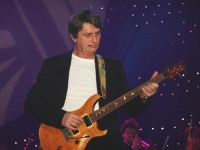
Michael Gordon Oldfield (born 15 May 1953) is a British musician, multi-instrumentalist and songwriter best known for his debut studio album Tubular Bells (1973), which became an unexpected critical and commercial success and propelled him to worldwide fame. Though primarily a guitarist, Oldfield is known for playing a range of instruments, which includes keyboards and percussion, and doing vocals. He has adopted a range of musical styles throughout his career, including progressive rock, world, folk, classical, electronic, ambient, and new age music.
Richard Gillard
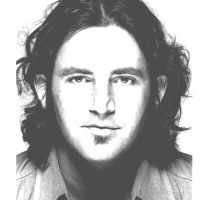
Richard Gillard Musical artist Songs The Servant Song Journeysongs Third Edition: Volume 27 · 2012 Servant Song
The Lords Prayer
The Lords Prayer
Philip Sparke

Philip Allen Sparke (born 29 December 1951) is an English composer and musician born in London, noted for his concert band and brass band music. His early major works include The Land of the Long White Cloud – "Aotearoa", written for the 1980 Centennial New Zealand Brass Band championship. He subsequently went on to win the EBU New Music for Band Competition three times, including in 1986 with a commission from the BBC called Orient Express.
Mushi-Shi
2005 ‧ Anime ‧ Ginko helps people with supernatural problems related to the Mushi.
Juri Takahashi

Juri Takahashi, also known mononymously as Juri, is a Japanese singer based in South Korea. She is a member of South Korean girl group Rocket Punch and former member of the Japanese girl group AKB48.
Company

Company is a musical with a book by George Furth and music and lyrics by Stephen Sondheim.
Originally entitled Threes, its plot revolves around Bobby (a single man unable to commit fully to a steady relationship, let alone marriage), the five married couples who are his best friends, and his three girlfriends. Unlike most book musicals, which follow a clearly delineated plot, Company is a concept musical composed of short vignettes, presented in no particular chronological order, linked by a celebration for Bobby's 35th birthday.
Company was among the first musicals to deal with adult problems through its music. As Sondheim put it, "they are middle-class people with middle class-problems." It is also one of the first musicals where the songs commented on the characters in the play instead of furthering the plot, a device which became a Sondheim standard.
Originally entitled Threes, its plot revolves around Bobby (a single man unable to commit fully to a steady relationship, let alone marriage), the five married couples who are his best friends, and his three girlfriends. Unlike most book musicals, which follow a clearly delineated plot, Company is a concept musical composed of short vignettes, presented in no particular chronological order, linked by a celebration for Bobby's 35th birthday.
Company was among the first musicals to deal with adult problems through its music. As Sondheim put it, "they are middle-class people with middle class-problems." It is also one of the first musicals where the songs commented on the characters in the play instead of furthering the plot, a device which became a Sondheim standard.
The Who
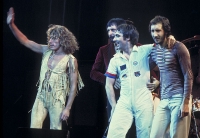
The Who are an English rock band formed in 1964. The primary lineup consisted of vocalist Roger Daltrey, guitarist Pete Townshend, bassist John Entwistle, and drummer Keith Moon. They became known for energetic live performances including the pioneering spectacle of instrument destruction. The Who have sold about 100 million records and have charted 27 top forty singles in the United Kingdom and United States with 17 top ten albums, including 18 Gold, 12 Platinum and 5 Multi-Platinum album awards in the United States alone.
The Who rose to fame in the UK with a series of top ten hit singles, boosted in part by pirate radio stations such as Radio Caroline, beginning in January 1965 with "I Can't Explain". The albums My Generation (1965), A Quick One (1966) and The Who Sell Out (1967) followed, with the first two hitting the UK top five. They first hit the U.S. Top 40 in 1967 with "Happy Jack" and hit the top ten later that year with "I Can See for Miles". Their fame grew with memorable performances at the Monterey Pop and Woodstock music festivals. The 1969 release of Tommy was the first in a series of top ten albums in the U.S., followed by Live at Leeds (1970), Who's Next (1971), Quadrophenia (1973), The Who By Numbers (1975), Who Are You (1978) and The Kids Are Alright (1979).
Moon died at the age of 32 in 1978, after which the band released two studio albums, the UK and U.S. top five Face Dances (1981) and the U.S. top ten It's Hard (1982), with drummer Kenney Jones, before disbanding in 1983. They re-formed at events such as Live Aid and for reunion tours such as their 25th anniversary tour (1989) and the Quadrophenia tours of 1996 and 1997. In 2000, the three surviving original members discussed recording an album of new material, but their plans temporarily stalled upon Entwistle's death at the age of 57 in 2002. Townshend and Daltrey continue to perform as The Who, and in 2006 they released the studio album Endless Wire, which reached the top ten in the UK and U.S.
The Who were inducted into the Rock and Roll Hall of Fame in 1990, their first year of eligibility. Their display there describes them as "Prime contenders, in the minds of many, for the title of World's Greatest Rock Band." The Los Angeles Times wrote that during their tenure as a quartet, the band "rivaled The Beatles, Bob Dylan and The Rolling Stones as the most vital rock voice of youth." Time Magazine wrote in 1979 that "No other group has ever pushed rock so far, or asked so much from it." They received a Lifetime Achievement Award from the British Phonographic Industry in 1988, and from the Grammy Foundation in 2001. In 2008 surviving members Townshend and Daltrey were honoured at the 31st Annual Kennedy Center Honors.
The Who rose to fame in the UK with a series of top ten hit singles, boosted in part by pirate radio stations such as Radio Caroline, beginning in January 1965 with "I Can't Explain". The albums My Generation (1965), A Quick One (1966) and The Who Sell Out (1967) followed, with the first two hitting the UK top five. They first hit the U.S. Top 40 in 1967 with "Happy Jack" and hit the top ten later that year with "I Can See for Miles". Their fame grew with memorable performances at the Monterey Pop and Woodstock music festivals. The 1969 release of Tommy was the first in a series of top ten albums in the U.S., followed by Live at Leeds (1970), Who's Next (1971), Quadrophenia (1973), The Who By Numbers (1975), Who Are You (1978) and The Kids Are Alright (1979).
Moon died at the age of 32 in 1978, after which the band released two studio albums, the UK and U.S. top five Face Dances (1981) and the U.S. top ten It's Hard (1982), with drummer Kenney Jones, before disbanding in 1983. They re-formed at events such as Live Aid and for reunion tours such as their 25th anniversary tour (1989) and the Quadrophenia tours of 1996 and 1997. In 2000, the three surviving original members discussed recording an album of new material, but their plans temporarily stalled upon Entwistle's death at the age of 57 in 2002. Townshend and Daltrey continue to perform as The Who, and in 2006 they released the studio album Endless Wire, which reached the top ten in the UK and U.S.
The Who were inducted into the Rock and Roll Hall of Fame in 1990, their first year of eligibility. Their display there describes them as "Prime contenders, in the minds of many, for the title of World's Greatest Rock Band." The Los Angeles Times wrote that during their tenure as a quartet, the band "rivaled The Beatles, Bob Dylan and The Rolling Stones as the most vital rock voice of youth." Time Magazine wrote in 1979 that "No other group has ever pushed rock so far, or asked so much from it." They received a Lifetime Achievement Award from the British Phonographic Industry in 1988, and from the Grammy Foundation in 2001. In 2008 surviving members Townshend and Daltrey were honoured at the 31st Annual Kennedy Center Honors.
Peter Warlock
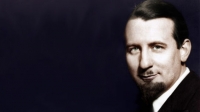
hilip Arnold Heseltine (30 October 1894 – 17 December 1930), known by the pseudonym Peter Warlock, was a British composer and music critic. The Warlock name, which reflects Heseltine's interest in occult practices, was used for all his published musical works. He is best known as a composer of songs and other vocal music; he also achieved notoriety in his lifetime through his unconventional and often scandalous lifestyle.
Pink Floyd
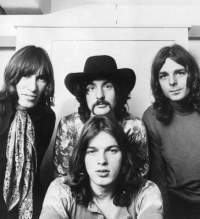
Pink Floyd are an English rock band from Cambridge. The band initially earned recognition for their psychedelic and space rock music, and, as they evolved, for their progressive rock music. Pink Floyd are known for philosophical lyrics, sonic experimentation, innovative album cover art, and elaborate live shows. One of rock music's most successful acts, the group have sold over 200 million albums worldwide including 74.5 million albums in the United States alone. Pink Floyd have influenced progressive rock artists of the 1970s such as Genesis and Yes; and contemporary artists such as Nine Inch Nails and Dream Theater.
Pink Floyd had moderate mainstream success and were one of the most popular bands in the London underground music scene in the late 1960s as a psychedelic band led by Syd Barrett. However, Barrett's erratic behaviour eventually forced his colleagues to replace him with guitarist and singer David Gilmour. After Barrett's departure, singer and bass player Roger Waters gradually became the dominant and driving force in the group by the late-1970s, until his eventual departure from the group in 1985. The band recorded several albums, achieving worldwide success with The Dark Side of the Moon (1973), Wish You Were Here (1975), Animals (1977), and The Wall (1979).
In 1985, Waters declared Pink Floyd "a spent force", but the remaining members, led by Gilmour, continued recording and touring under the name Pink Floyd. Waters sued them for the name and eventually they reached a settlement out of court, under which Gilmour, Mason and Wright would continue as Pink Floyd. They again enjoyed worldwide success with A Momentary Lapse of Reason (1987) and The Division Bell (1994). Waters performed with the band for the first time in 24 years on 2 July 2005 at the London Live 8 concert.
Pink Floyd had moderate mainstream success and were one of the most popular bands in the London underground music scene in the late 1960s as a psychedelic band led by Syd Barrett. However, Barrett's erratic behaviour eventually forced his colleagues to replace him with guitarist and singer David Gilmour. After Barrett's departure, singer and bass player Roger Waters gradually became the dominant and driving force in the group by the late-1970s, until his eventual departure from the group in 1985. The band recorded several albums, achieving worldwide success with The Dark Side of the Moon (1973), Wish You Were Here (1975), Animals (1977), and The Wall (1979).
In 1985, Waters declared Pink Floyd "a spent force", but the remaining members, led by Gilmour, continued recording and touring under the name Pink Floyd. Waters sued them for the name and eventually they reached a settlement out of court, under which Gilmour, Mason and Wright would continue as Pink Floyd. They again enjoyed worldwide success with A Momentary Lapse of Reason (1987) and The Division Bell (1994). Waters performed with the band for the first time in 24 years on 2 July 2005 at the London Live 8 concert.
Chris Cheek
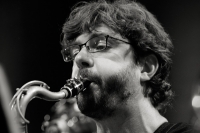
Cheek was born in St. Louis, Missouri, where his father was the director of a Junior high school band. Cheek began learning to play the alto saxophone at age eleven, and upon graduation from high school, he attended Webster University. He studied at the Berklee College of Music under Joe Viola, Hal Crook, and Herb Pomeroy, and earned his bachelor's degree. He moved to New York City in 1992, where he played with Paul Motian in the Electric Bebop Band, and co-founded Bloomdaddies with Seamus Blake. He also played with Guillermo Klein, Mika Pohjola, Luciana Souza, and David Berkman.
Dani Martín
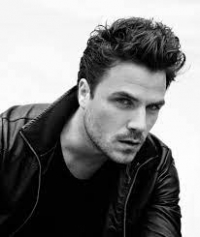
Daniel Martín García (born 19 February 1977) is a Spanish singer. He was the vocalist of the Spanish pop punk band El Canto del Loco (ECDL)He was born on 19 February 1977 in Alcobendas, a city in the province of Madrid.
When he was a child, he used to imitate his favorite artists in the living room and started to dream about creating his own band. As he was not a really good student, he started to work with his father and, at the same time, he began to study at the Drama School William Layton. Later, Dani decided to attend prestigious Drama School Cristina Rota, where he got his first jobs as a stage actor. The first time he appeared on television was with Martes y 13 in a show prepared for New Year’s Eve. Then, he presented a program called Ponte las Pilas.
When he was a child, he used to imitate his favorite artists in the living room and started to dream about creating his own band. As he was not a really good student, he started to work with his father and, at the same time, he began to study at the Drama School William Layton. Later, Dani decided to attend prestigious Drama School Cristina Rota, where he got his first jobs as a stage actor. The first time he appeared on television was with Martes y 13 in a show prepared for New Year’s Eve. Then, he presented a program called Ponte las Pilas.
Traditional

David Joseph
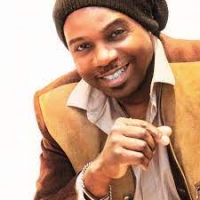
David Joseph was the keyboardist and at times de facto leader of Hi-Tension, a late-'70s disco outfit whose hits such as the "British Hustle" were largely confined to the United Kingdom. Joseph left the band in 1984, a year after releasing a solo album on Island Records.
Epik High

Epik High (Hangul: 에픽하이) is a South Korean indie hip hop group from Seoul, South Korea. The group is composed of Tablo, Mithra Jin and DJ Tukutz. The group went on hiatus in 2009 as a result of DJ Tukutz being called for mandatory military service.
Epik High was relatively unknown early in their career due to hip-hop's lack of popularity in Korea. Their success began with the release of their second album, titled "High Society". Upon the success of their third album, "Swan Songs", released in late 2005, Epik High has become one of the most popular hip-hop groups in Korea. "Fly", the title song, and "Paris" (feat. Jisun from Loveholic) from their third album became hits in Korea, reaching number one on many Korean music channels as well as on online music charts. "Fly" was also chosen for the video games FIFA 07 and Pump it up, this song has now become a popular track for dancers/freestylers. Epik High's fourth album, "Remapping the Human Soul", released in January 23, 2007 has shown a very different music style from their previous albums. "Fan", the fourth album's title song, and "Love Love Love" have been big hits in 2007.
Epik High was relatively unknown early in their career due to hip-hop's lack of popularity in Korea. Their success began with the release of their second album, titled "High Society". Upon the success of their third album, "Swan Songs", released in late 2005, Epik High has become one of the most popular hip-hop groups in Korea. "Fly", the title song, and "Paris" (feat. Jisun from Loveholic) from their third album became hits in Korea, reaching number one on many Korean music channels as well as on online music charts. "Fly" was also chosen for the video games FIFA 07 and Pump it up, this song has now become a popular track for dancers/freestylers. Epik High's fourth album, "Remapping the Human Soul", released in January 23, 2007 has shown a very different music style from their previous albums. "Fan", the fourth album's title song, and "Love Love Love" have been big hits in 2007.
Pamela Wedgwood
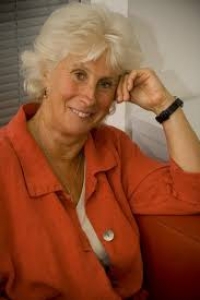
Born in 1947, Pam’s musical career began with the recorder and piano, and Tenor Horn and Euphonium through the brass band tradition at her school. She then took up the Cello and French Horn, entering Trinity College of Music in London to study Piano, Horn, Cello and composition at the age of sixteen.
Final Fantasy X
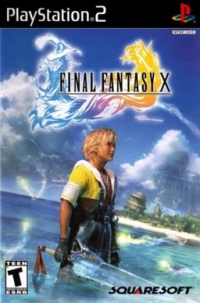
Final Fantasy X (ファイナルファンタジーX Fainaru Fantajī Ten?) is a console role-playing game developed and published by Square (now Square Enix) as the tenth title in the Final Fantasy series. It was released in 2001 for Sony's PlayStation 2. The game marks the Final Fantasy series' transition from entirely pre-rendered backdrops to fully three-dimensional areas, and is also the first in the series to feature voice acting. Final Fantasy X replaces the Active Time Battle (ATB) system with a new Conditional Turn-Based Battle (CTB) system, and uses a new leveling system called the "Sphere Grid".
Set in the fantasy world of Spira, the game's story centers around a group of adventurers and their quest to defeat a rampaging monster known as "Sin". The player character is Tidus, a blitzball star who finds himself in Spira after his home city of Zanarkand is destroyed by Sin. During the game, Tidus, along with several others, aids the summoner Yuna on her pilgrimage to destroy Sin.
Development of Final Fantasy X began in 1999, with a budget of more than US$32.3 million and a team of more than 100 people. The game was the first in the main series not entirely scored by Nobuo Uematsu; Masashi Hamauzu and Junya Nakano were signed as Uematsu's fellow composers. Final Fantasy X was both a critical and commercial success. It was voted by the readers of the Japanese video game magazine Famitsu to be the greatest video game of all-time. As of January 2004, the game has sold 6.6 million units worldwide. In 2003, it was followed by Final Fantasy X-2, making it the first Final Fantasy game to have a direct sequel.
Set in the fantasy world of Spira, the game's story centers around a group of adventurers and their quest to defeat a rampaging monster known as "Sin". The player character is Tidus, a blitzball star who finds himself in Spira after his home city of Zanarkand is destroyed by Sin. During the game, Tidus, along with several others, aids the summoner Yuna on her pilgrimage to destroy Sin.
Development of Final Fantasy X began in 1999, with a budget of more than US$32.3 million and a team of more than 100 people. The game was the first in the main series not entirely scored by Nobuo Uematsu; Masashi Hamauzu and Junya Nakano were signed as Uematsu's fellow composers. Final Fantasy X was both a critical and commercial success. It was voted by the readers of the Japanese video game magazine Famitsu to be the greatest video game of all-time. As of January 2004, the game has sold 6.6 million units worldwide. In 2003, it was followed by Final Fantasy X-2, making it the first Final Fantasy game to have a direct sequel.
Brahms

Johannes Brahms (May 7, 1833 â April 3, 1897) was a German composer of the Romantic period. He was born in Hamburg and in his later years he settled in Vienna, Austria.
Brahms maintained a Classical sense of form and order in his works â in contrast to the opulence of the music of many of his contemporaries. Thus many admirers (though not necessarily Brahms himself) saw him as the champion of traditional forms and "pure music," as opposed to the New German embrace of program music.
Brahms venerated Beethoven: in the composer's home, a marble bust of Beethoven looked down on the spot where he composed, and some passages in his works are reminiscent of Beethoven's style. The main theme of the finale of Brahms's First Symphony is reminiscent of the main theme of the finale of Beethoven's Ninth, and when this resemblance was pointed out to Brahms he replied that any ass â jeder Esel â could see that.
Ein deutsches Requiem was partially inspired by his mother's death in 1865, but also incorporates material from a Symphony he started in 1854, but abandoned following Schumann's suicide attempt. He once wrote that the Requiem "belonged to Schumann". The first movement of this abandoned Symphony was re-worked as the first movement of the First Piano Concerto.
Brahms also loved the Classical composers Mozart and Haydn. He collected first editions and autographs of their works, and edited performing editions. He also studied the music of pre-classical composers, including Giovanni Gabrieli, Johann Adolph Hasse, Heinrich Schütz and especially Johann Sebastian Bach. His friends included leading musicologists, and with Friedrich Chrysander he edited an edition of the works of François Couperin. He looked to older music for inspiration in the arts of strict counterpoint; the themes of some of his works are modelled on Baroque sources, such as Bach's The Art of Fugue in the fugal finale of Cello Sonata No. 1, or the same composer's Cantata No. 150 in the passacaglia theme of the Fourth Symphony's finale.
Brahms maintained a Classical sense of form and order in his works â in contrast to the opulence of the music of many of his contemporaries. Thus many admirers (though not necessarily Brahms himself) saw him as the champion of traditional forms and "pure music," as opposed to the New German embrace of program music.
Brahms venerated Beethoven: in the composer's home, a marble bust of Beethoven looked down on the spot where he composed, and some passages in his works are reminiscent of Beethoven's style. The main theme of the finale of Brahms's First Symphony is reminiscent of the main theme of the finale of Beethoven's Ninth, and when this resemblance was pointed out to Brahms he replied that any ass â jeder Esel â could see that.
Ein deutsches Requiem was partially inspired by his mother's death in 1865, but also incorporates material from a Symphony he started in 1854, but abandoned following Schumann's suicide attempt. He once wrote that the Requiem "belonged to Schumann". The first movement of this abandoned Symphony was re-worked as the first movement of the First Piano Concerto.
Brahms also loved the Classical composers Mozart and Haydn. He collected first editions and autographs of their works, and edited performing editions. He also studied the music of pre-classical composers, including Giovanni Gabrieli, Johann Adolph Hasse, Heinrich Schütz and especially Johann Sebastian Bach. His friends included leading musicologists, and with Friedrich Chrysander he edited an edition of the works of François Couperin. He looked to older music for inspiration in the arts of strict counterpoint; the themes of some of his works are modelled on Baroque sources, such as Bach's The Art of Fugue in the fugal finale of Cello Sonata No. 1, or the same composer's Cantata No. 150 in the passacaglia theme of the Fourth Symphony's finale.
Enya
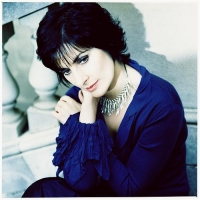
Enya (born Eithne Patricia Nà Bhraonáinon May 17, 1961, Gaoth Dobhair, County Donegal, Ireland), sometimes presented in the media as Enya Brennan, is an Irish singer, instrumentalist and composer. She is Ireland's best-selling solo artist and is officially the country's second biggest musical export (after U2). Her works have earned her four Grammy Awards and an Academy Award nomination, and she is also famous for performing in 10 different languages during her lengthy career. Enya is an approximate transcription of how Eithne is pronounced in her native Irish, in the Donegal dialect.
Joe Hisaishi

Mamoru Fujisawa (藤澤 守 Fujisawa Mamoru?), known professionally as Joe Hisaishi (久石 譲 Hisaishi Jō?, born December 6, 1950), is a composer and director known for over 100 film scores and solo albums dating back to 1981.
While possessing a stylistically distinct sound, Hisaishi's music has been known to explore and incorporate different genres, including minimalist, experimental electronic, European classical, and Japanese classical. Lesser known are the other musical roles he plays; he is also a typesetter, author, arranger, and head of an orchestra.
He is best known for his work with animator Hayao Miyazaki, having composed scores for many of his films including Nausicaä of the Valley of the Wind (1984), My Neighbor Totoro (1988), Princess Mononoke (1997), Spirited Away (2001), Howl's Moving Castle (2004) and Ponyo (2008). He is also recognized for the soundtracks he has provided for filmmaker 'Beat' Takeshi Kitano, including Dolls (2002), Kikujiro (1999), Hana-bi (1997), Kids Return (1996), Sonatine (1993).
While possessing a stylistically distinct sound, Hisaishi's music has been known to explore and incorporate different genres, including minimalist, experimental electronic, European classical, and Japanese classical. Lesser known are the other musical roles he plays; he is also a typesetter, author, arranger, and head of an orchestra.
He is best known for his work with animator Hayao Miyazaki, having composed scores for many of his films including Nausicaä of the Valley of the Wind (1984), My Neighbor Totoro (1988), Princess Mononoke (1997), Spirited Away (2001), Howl's Moving Castle (2004) and Ponyo (2008). He is also recognized for the soundtracks he has provided for filmmaker 'Beat' Takeshi Kitano, including Dolls (2002), Kikujiro (1999), Hana-bi (1997), Kids Return (1996), Sonatine (1993).
Roger Hodgson
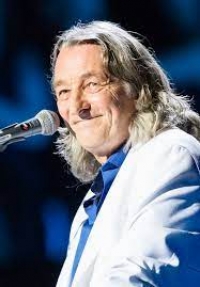
Charles Roger Pomfret Hodgson (born 21 March 1950) is an English musician, singer and songwriter, best known as the former co-frontman and founding member of progressive rock band Supertramp. Hodgson composed and sang the majority of the band’s hits such as "Dreamer", "Give a Little Bit", "Take the Long Way Home", "The Logical Song", "It's Raining Again", and "Breakfast in America".
Marcos Witt
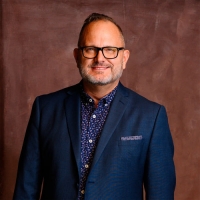
Marcos Witt is an American Christian music singer and pastor. Witt is considered the most influential and famous Spanish speaking figure of Christian music. Nola Witt continued the mission work after his death. Some years later, she married Frank Warren. Together, they began to build new churches in Durango, Mexico. The couple had two children.
Tom Kitt
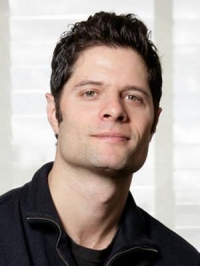
Thomas Robert "Tom" Kitt (born 1974) is an American composer, conductor, orchestrator and musician. For his score for the musical Next to Normal, he shared the 2010 Pulitzer Prize for Drama with Brian Yorkey. He also won the Tony Award and 2008 Outer Critics Circle Award, and was nominated for a Drama Desk Award for American Idiot and Everyday Rapture.
Floyd Cramer
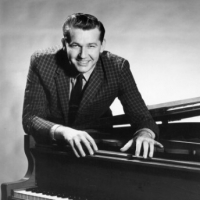
Floyd Cramer was an American pianist who was inducted into both the Country Music Hall of Fame and the Rock and Roll Hall of Fame. His signature playing style was a cornerstone of the pop-oriented "Nashville sound" of the 1950s and 1960s.
Usher

Usher Raymond IV (born October 14, 1978), known simply by his first name Usher, is an American R&B and pop singer-songwriter and actor who rose to fame in the 1990s. To date, he has sold approximately 30 million albums worldwide and has won five Grammy Awards. Usher is a part owner of the Cleveland Cavaliers franchise, and has his own record label, US Records. On September 13, 2008 Usher has been inducted into the All time Hot 100 Artist by the Billboard Hot 100. He is one of the few artists of his generation to be mentioned.
Vivaldi

Antonio Lucio Vivaldi (March 4, 1678 â July 28, 1741), nicknamed il Prete Rosso ("The Red Priest"), was a Venetian priest and Baroque music composer, as well as a famous virtuoso violinist; he was born and raised in the Republic of Venice. The Four Seasons, a series of four violin concerti, is his best-known work and a highly popular Baroque piece.
Many of Vivaldi's compositions reflect a flamboyant, almost playful, exuberance. Most of Vivaldi's repertoire was rediscovered only in the first half of the 20th century in Turin and Genoa and was published in the second half. Vivaldi's music is innovative, breaking a consolidated tradition in schemes; he gave brightness to the formal and the rhythmic structure of the concerto, repeatedly looking for harmonic contrasts and innovative melodies and themes. Moreover, Vivaldi was able to compose nonacademic music, particularly meant to be appreciated by the wide public and not only by an intellectual minority. The joyful appearance of his music reveals in this regard a transmissible joy of composing; these are among the causes of the vast popularity of his music. This popularity soon made him famous in other countries such as France which was, at the time, very independent concerning its musical taste.
Vivaldi is considered one of the composers who brought Baroque music (with its typical contrast among heavy sonorities) to evolve into a classical style. Johann Sebastian Bach was deeply influenced by Vivaldi's concertos and arias (recalled in his Johannes Passion, Matthäuspassion, and cantatas). Bach transcribed a number of Vivaldi's concerti for solo keyboard, along with a number for orchestra, including the famous Concerto for Four Violins and Violoncello, Strings and Continuo (RV 580).
Many of Vivaldi's compositions reflect a flamboyant, almost playful, exuberance. Most of Vivaldi's repertoire was rediscovered only in the first half of the 20th century in Turin and Genoa and was published in the second half. Vivaldi's music is innovative, breaking a consolidated tradition in schemes; he gave brightness to the formal and the rhythmic structure of the concerto, repeatedly looking for harmonic contrasts and innovative melodies and themes. Moreover, Vivaldi was able to compose nonacademic music, particularly meant to be appreciated by the wide public and not only by an intellectual minority. The joyful appearance of his music reveals in this regard a transmissible joy of composing; these are among the causes of the vast popularity of his music. This popularity soon made him famous in other countries such as France which was, at the time, very independent concerning its musical taste.
Vivaldi is considered one of the composers who brought Baroque music (with its typical contrast among heavy sonorities) to evolve into a classical style. Johann Sebastian Bach was deeply influenced by Vivaldi's concertos and arias (recalled in his Johannes Passion, Matthäuspassion, and cantatas). Bach transcribed a number of Vivaldi's concerti for solo keyboard, along with a number for orchestra, including the famous Concerto for Four Violins and Violoncello, Strings and Continuo (RV 580).
Coldplay

Coldplay are a rock band formed in London, England in 1997. The group comprises vocalist/pianist/guitarist Chris Martin, lead guitarist Jonny Buckland, bassist Guy Berryman, and drummer/multi-instrumentalist Will Champion. Coldplay have sold 34.6 million albums, and are also known for their hit singles, such as "Yellow", "The Scientist", "Speed of Sound", "Fix You", "Viva la Vida" and the Grammy Award-winning "Clocks".
Coldplay achieved worldwide fame with the release of their single "Yellow", followed by their debut album, Parachutes (2000), which was nominated for the Mercury Prize. Its follow-up, A Rush of Blood to the Head (2002) won multiple awards such as NME's Album of the Year and was later included on Rolling Stone magazine's 500 Greatest Albums of All Time list, ranking at #473. Their next release, X&Y (2005), received a slightly less enthusiastic yet still generally positive reception. The band's fourth studio album, Viva la Vida or Death and All His Friends (2008), was produced by Brian Eno and released again to largely favourable reviews. All of Coldplay's albums have enjoyed great commercial success.
Coldplay's early material was compared to acts such as Jeff Buckley, U2, and Travis. Coldplay have been an active supporter of various social and political causes, such as Oxfam's Make Trade Fair campaign and Amnesty International. The group have also performed at various charity projects such as Band Aid 20, Live 8, and the Teenage Cancer Trust.
Coldplay achieved worldwide fame with the release of their single "Yellow", followed by their debut album, Parachutes (2000), which was nominated for the Mercury Prize. Its follow-up, A Rush of Blood to the Head (2002) won multiple awards such as NME's Album of the Year and was later included on Rolling Stone magazine's 500 Greatest Albums of All Time list, ranking at #473. Their next release, X&Y (2005), received a slightly less enthusiastic yet still generally positive reception. The band's fourth studio album, Viva la Vida or Death and All His Friends (2008), was produced by Brian Eno and released again to largely favourable reviews. All of Coldplay's albums have enjoyed great commercial success.
Coldplay's early material was compared to acts such as Jeff Buckley, U2, and Travis. Coldplay have been an active supporter of various social and political causes, such as Oxfam's Make Trade Fair campaign and Amnesty International. The group have also performed at various charity projects such as Band Aid 20, Live 8, and the Teenage Cancer Trust.
Nino Rota

Nino Rota (December 3, 1911, Milan – April 10, 1979, Rome) was a world-renowned Italian composer and academic who is best known for his film scores, notably for the films of Federico Fellini and Luchino Visconti. He also composed the music for two of Franco Zeffirelli's Shakespeare films, and for the first two films of Francis Ford Coppola's Godfather trilogy.
During his long career Rota was an extraordinarily prolific composer, especially of music for the cinema. He wrote more than 150 scores for Italian and international productions from the 1930s until his death in 1979—an average of three scores each year over a 46 year period, and in his most productive period from the late 1940s to the mid-1950s he wrote as many as ten scores every year, and sometimes more, with a remarkable thirteen film scores to his credit in 1954. Alongside this great body film work, he composed ten operas, five ballets and dozens of other orchestral, choral and chamber works, the best known being his string concerto. He also composed the music for many theatre productions by Visconti, Zeffirelli and Eduardo de Filippo as well as maintaining a long teaching career at the Liceo Musicale in Bari, Italy, where he was the director for almost 30 years.
During his long career Rota was an extraordinarily prolific composer, especially of music for the cinema. He wrote more than 150 scores for Italian and international productions from the 1930s until his death in 1979—an average of three scores each year over a 46 year period, and in his most productive period from the late 1940s to the mid-1950s he wrote as many as ten scores every year, and sometimes more, with a remarkable thirteen film scores to his credit in 1954. Alongside this great body film work, he composed ten operas, five ballets and dozens of other orchestral, choral and chamber works, the best known being his string concerto. He also composed the music for many theatre productions by Visconti, Zeffirelli and Eduardo de Filippo as well as maintaining a long teaching career at the Liceo Musicale in Bari, Italy, where he was the director for almost 30 years.
The Village People

Village People is a concept disco group formed in the late 1970s, well known for their on-stage costumes as well as their catchy tunes and suggestive lyrics. Original members were: Victor Willis (police officer), Felipe Rose (American Indian chief), Randy Jones (cowboy), Glenn Hughes (biker), David Hodo (construction worker) and Alex Briley (Military man). For the release of "In the Navy", Willis and Briley appeared as an admiral and a sailor, respectively. Originally created to target disco's primarily gay audience by featuring stereotypical gay fantasy personas, the band's popularity quickly brought them into mainstream.
Village People scored a number of disco and dance hits, including their trademark "Macho Man", "Go West", the classic club medley of "San Francisco (You've Got Me) / In Hollywood (Everybody is a Star)", "In the Navy", "Can't Stop the Music", and their biggest hit, "Y.M.C.A.".
In September, 2008 the group received a star on the Hollywood Walk of Fame. They have sold upwards of 50 million records world-wide.
Village People scored a number of disco and dance hits, including their trademark "Macho Man", "Go West", the classic club medley of "San Francisco (You've Got Me) / In Hollywood (Everybody is a Star)", "In the Navy", "Can't Stop the Music", and their biggest hit, "Y.M.C.A.".
In September, 2008 the group received a star on the Hollywood Walk of Fame. They have sold upwards of 50 million records world-wide.
Shira Kammen
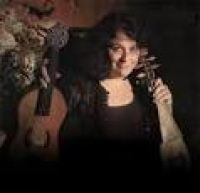
Shira Kammen is a multi-instrumentalist and vocalist.She received her degree in music from the University of California, Berkeley and studied vielle with Margriet Tindemans. She has performed and taught throughout the world and has played on several television and movie soundtracks, including "O", a modern high school-setting of Othello. Her music was also licensed for the soundtrack of the video game Braid.She currently lives in El Cerrito, California.
Eudenice Palaruan
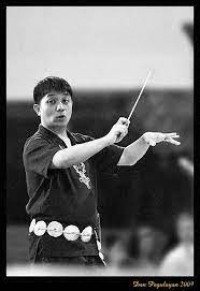
Eudenice V. Palaruan is a Filipino conductor, composer, music educator. Palaruan is one of the Philippines' most esteemed church musician in the area of choral music. As a choral artist, he has worked with the Philippines' top groups. His compositions and arrangements are highly sought after.
Sperion

Sperion Musician/band. Anime / Game / J-Drama / Japanese popular music and soundtrack transcriber / arranger.
Genesis
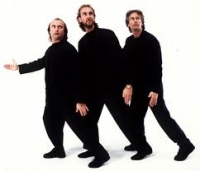
Genesis are an English rock band that formed in 1967. The band currently comprises the longest-tenured members Phil Collins, Mike Rutherford and Tony Banks. Past members Peter Gabriel, Anthony Phillips and Steve Hackett also played major roles in the band in its early years. Genesis are among the top 30 highest-selling recording artists of all time with approximately 150 million albums sold worldwide.
Tchaikovsky

Pyotr Il'yich Tchaikovsky (May 7 1840 â November 6 1893) was a Russian composer of the Romantic era. While not part of the nationalistic music group known as "The Five", Tchaikovsky wrote music which, in the opinion of Harold Schonberg, was distinctly Russian: plangent, introspective, with modally-inflected melody and harmony.
Aesthetically, Tchaikovsky remained open to all aspects of Saint Petersburg musical life. He was impressed by Serov and Balakirev as well as the classical values upheld by the conservatory. Both the progressive and conservative camps in Russian music at the time attempted to win him over. Tchaikovsky charted his compositional course between these two factions, retaining his individuality as a composer as well as his Russian identity. In this he was influenced by the ideals of his teacher Nikolai Rubinstein and Nikolai's brother Anton.
Tchaikovsky's musical cosmopolitanism led him to be favored by many Russian music-lovers over the "Russian" harmonies and styles of Mussorgsky, Borodin and Rimsky-Korsakov.
Nonetheless he frequently adapted Russian traditional melodies and dance forms in his music, which enhanced his success in his home country. The success in St. Petersburg at the premiere of his Third Orchestral Suite may have been due in large part to his concluding the work with a polonaise. He also used a polonaise for the final movement of his Third Symphony.
Aesthetically, Tchaikovsky remained open to all aspects of Saint Petersburg musical life. He was impressed by Serov and Balakirev as well as the classical values upheld by the conservatory. Both the progressive and conservative camps in Russian music at the time attempted to win him over. Tchaikovsky charted his compositional course between these two factions, retaining his individuality as a composer as well as his Russian identity. In this he was influenced by the ideals of his teacher Nikolai Rubinstein and Nikolai's brother Anton.
Tchaikovsky's musical cosmopolitanism led him to be favored by many Russian music-lovers over the "Russian" harmonies and styles of Mussorgsky, Borodin and Rimsky-Korsakov.
Nonetheless he frequently adapted Russian traditional melodies and dance forms in his music, which enhanced his success in his home country. The success in St. Petersburg at the premiere of his Third Orchestral Suite may have been due in large part to his concluding the work with a polonaise. He also used a polonaise for the final movement of his Third Symphony.
The Doors
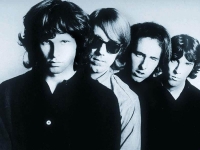
The Doors were an American rock band formed in 1965 in Los Angeles by vocalist Jim Morrison, keyboardist Ray Manzarek, drummer John Densmore, and guitarist Robby Krieger. They were considered a controversial band, due mostly to Morrison's cryptic lyrics and unpredictable stage persona. The band dissolved in March 1973, short of two years after Morrison's death in July 1971. According to the RIAA, they have sold over 32 million albums in the US alone.
The Doors' music during the 1965-68 era was a fusion of hard rock, blues-rock, and acid rock. The origins of The Doors lay in a chance meeting between acquaintances and fellow UCLA film school alumni Jim Morrison and Ray Manzarek on Venice Beach California in July 1965. Morrison told Manzarek he had been writing songs (Morrison said "I was taking notes at a fantasic rock-n-roll concert going on in my head") and, at Manzarek's encouragement, sang "Moonlight Drive". Impressed by Morrison's lyrics, Manzarek suggested they form a band.
The Doors' music during the 1965-68 era was a fusion of hard rock, blues-rock, and acid rock. The origins of The Doors lay in a chance meeting between acquaintances and fellow UCLA film school alumni Jim Morrison and Ray Manzarek on Venice Beach California in July 1965. Morrison told Manzarek he had been writing songs (Morrison said "I was taking notes at a fantasic rock-n-roll concert going on in my head") and, at Manzarek's encouragement, sang "Moonlight Drive". Impressed by Morrison's lyrics, Manzarek suggested they form a band.
Leonard Cohen
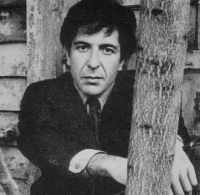
Leonard Norman Cohen, CC, GOQ (born September 21, 1934) is a Canadian singer-songwriter, musician, poet and novelist. Cohen published his first book of poetry in Montreal in 1956 and his first novel in 1963. His work often deals with the exploration of religion, isolation, sexuality and complex interpersonal relationships. Famously reclusive, spending years in a Zen Buddhist monastery, and possessing a persona frequently associated with mystique, he is extremely well-regarded by critics for his literary accomplishments and for producing an output of work of high artistic quality over a five-decade career.
Musically, Cohen's earliest songs (many of which appeared on the 1967 album, Songs of Leonard Cohen) were rooted in European folk music. In the 1970s, his material encompassed pop, cabaret and world music. Since the 1980s his high baritone voice has evolved into lower registers (bass baritone and bass), with accompaniment from a wide variety of instruments and female backing singers.
Over 2,000 renditions of Cohen's songs have been recorded. Cohen has been inducted into both the Canadian Music Hall of Fame and the Canadian Songwriters Hall of Fame and is also a Companion of the Order of Canada, the nation's highest civilian honour. While giving the speech at Cohen's induction into the American Rock and Roll Hall of Fame on March 10, 2008, Lou Reed described Cohen as belonging to the "highest and most influential echelon of songwriters".
Musically, Cohen's earliest songs (many of which appeared on the 1967 album, Songs of Leonard Cohen) were rooted in European folk music. In the 1970s, his material encompassed pop, cabaret and world music. Since the 1980s his high baritone voice has evolved into lower registers (bass baritone and bass), with accompaniment from a wide variety of instruments and female backing singers.
Over 2,000 renditions of Cohen's songs have been recorded. Cohen has been inducted into both the Canadian Music Hall of Fame and the Canadian Songwriters Hall of Fame and is also a Companion of the Order of Canada, the nation's highest civilian honour. While giving the speech at Cohen's induction into the American Rock and Roll Hall of Fame on March 10, 2008, Lou Reed described Cohen as belonging to the "highest and most influential echelon of songwriters".
Haydn

Franz Joseph Haydn (March 31, 1732 – May 31, 1809) was one of the most prominent composers of the classical period, and is called by some the "Father of the Symphony" and "Father of the String Quartet".
A life-long resident of Austria, Haydn spent most of his career as a court musician for the wealthy Hungarian Esterházy family on their remote estate. Isolated from other composers and trends in music until the later part of his long life, he was, as he put it, "forced to become original".
Although Haydn is still often called "Franz Joseph Haydn", the composer did not use the name "Franz" during his lifetime and this misnomer is avoided by modern scholars and historians. Joseph Haydn was the brother of Michael Haydn, himself a highly regarded composer, and Johann Evangelist Haydn, a tenor.
A central characteristic of Haydn's music is the development of larger structures out of very short, simple musical motifs, often derived from standard accompanying figures. The music is often quite formally concentrated, and the important musical events of a movement can unfold rather quickly.
Haydn's work was central to the development of what came to be called sonata form. His practice, however, differed in some ways from that of Mozart and Beethoven, his younger contemporaries who likewise excelled in this form of composition. Haydn was particularly fond of the so-called "monothematic exposition", in which the music that establishes the dominant key is similar or identical to the opening theme. Haydn also differs from Mozart and Beethoven in his recapitulation sections, where he often rearranges the order of themes compared to the exposition and uses extensive thematic development.
Perhaps more than any other composer's, Haydn's music is known for its humour. The most famous example is the sudden loud chord in the slow movement of his "Surprise" symphony; Haydn's many other musical jokes include numerous false endings (e.g., in the quartets Op. 33 No. 2 and Op. 50 No. 3), and the remarkable rhythmic illusion placed in the trio section of the third movement of Op. 50 No. 1.
A life-long resident of Austria, Haydn spent most of his career as a court musician for the wealthy Hungarian Esterházy family on their remote estate. Isolated from other composers and trends in music until the later part of his long life, he was, as he put it, "forced to become original".
Although Haydn is still often called "Franz Joseph Haydn", the composer did not use the name "Franz" during his lifetime and this misnomer is avoided by modern scholars and historians. Joseph Haydn was the brother of Michael Haydn, himself a highly regarded composer, and Johann Evangelist Haydn, a tenor.
A central characteristic of Haydn's music is the development of larger structures out of very short, simple musical motifs, often derived from standard accompanying figures. The music is often quite formally concentrated, and the important musical events of a movement can unfold rather quickly.
Haydn's work was central to the development of what came to be called sonata form. His practice, however, differed in some ways from that of Mozart and Beethoven, his younger contemporaries who likewise excelled in this form of composition. Haydn was particularly fond of the so-called "monothematic exposition", in which the music that establishes the dominant key is similar or identical to the opening theme. Haydn also differs from Mozart and Beethoven in his recapitulation sections, where he often rearranges the order of themes compared to the exposition and uses extensive thematic development.
Perhaps more than any other composer's, Haydn's music is known for its humour. The most famous example is the sudden loud chord in the slow movement of his "Surprise" symphony; Haydn's many other musical jokes include numerous false endings (e.g., in the quartets Op. 33 No. 2 and Op. 50 No. 3), and the remarkable rhythmic illusion placed in the trio section of the third movement of Op. 50 No. 1.
Ray Brown

Raymond Matthews Brown was an American jazz double bassist known for extensive work with Oscar Peterson and Ella Fitzgerald.
Los Panchos
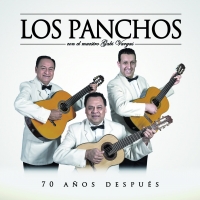
Originally, Trio Los Panchos are a trío romántico formed in New York City in 1944 by Alfredo Gil, Chucho Navarro, and Hernando Avilés. The trio became one of the leading exponents of the bolero and the romantic ballad in Latin America.
Debussy

Achille-Claude Debussy (August 22, 1862 – March 25, 1918) was a French composer. Along with Maurice Ravel, he is considered one of the most prominent figures working within the field of Impressionist music, though he himself intensely disliked the term when applied to his compositions. Debussy was not only among the most important of all French composers but also was a central figure in all European music at the turn of the twentieth century.
Debussy's music virtually defines the transition from late-Romantic music to twentieth century modernist music. In French literary circles, the style of this period was known as Symbolism, a movement that directly inspired Debussy both as a composer and as an active cultural participant.
Debussy's music virtually defines the transition from late-Romantic music to twentieth century modernist music. In French literary circles, the style of this period was known as Symbolism, a movement that directly inspired Debussy both as a composer and as an active cultural participant.
Andy Mckee
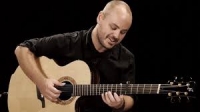
Andy McKee (born April 4, 1979, in Topeka, Kansas) is an American fingerstyle guitar player, currently signed to the American record label Razor & Tie.
His style of playing and his compositions have earned him a considerable international fanbase. In late 2006, a live performance of his signature song "Drifting" became a Featured Video on YouTube and MySpace, achieving over 48 million views on the former to date and remaining one of its highest-rated music clips. A handful of McKee's other songs have experienced notable success on YouTube, such as "Rylynn" with over 22 million views. Similarly, McKee's cover of "Africa" reached over 9 million views before suddenly being removed by Candyrat Records.
His style of playing and his compositions have earned him a considerable international fanbase. In late 2006, a live performance of his signature song "Drifting" became a Featured Video on YouTube and MySpace, achieving over 48 million views on the former to date and remaining one of its highest-rated music clips. A handful of McKee's other songs have experienced notable success on YouTube, such as "Rylynn" with over 22 million views. Similarly, McKee's cover of "Africa" reached over 9 million views before suddenly being removed by Candyrat Records.
Astor Piazzolla

Ástor Pantaleón Piazzolla (March 11, 1921 – July 4, 1992) was an Argentine tango composer and bandoneón player. His oeuvre revolutionized the traditional tango into a new style termed nuevo tango, incorporating elements from jazz and classical music. An excellent bandoneonist, he regularly performed his own compositions with different ensembles.
Piazzolla's nuevo tango was distinct from the traditional tango in its incorporation of elements of jazz, its use of extended harmonies and dissonance, its use of counterpoint, and its ventures into extended compositional forms. As Argentine psychoanalyst Carlos Kuri has pointed out, Piazzolla's fusion of tango with this wide range of other recognizable Western musical elements was so successful that it produced a new individual style transcending these influences. It is precisely this success, and individuality, that makes it hard to pin down where particular influences reside in his compositions, but some aspects are clear. The use of the passacaglia technique of a circulating bass line and harmonic sequence, invented and much used in 17th and 18th century baroque music but also central to the idea of jazz "changes", predominates in most of Piazzolla's mature compositions. Another clear reference to the baroque is the often complex and virtuosic counterpoint that sometimes follows strict fugal behavior but more often simply allows each performer in the group to assert his voice. A further technique that emphasises this sense of democracy and freedom among the musicians is improvisation that is borrowed from jazz in concept, but in practice involves a different vocabulary of scales and rhythms that stay within the parameters of the established tango sound-world. Pablo Ziegler has been particularly responsible for developing this aspect of the style both within Piazzolla's groups and since the composer's death.
Piazzolla's nuevo tango was distinct from the traditional tango in its incorporation of elements of jazz, its use of extended harmonies and dissonance, its use of counterpoint, and its ventures into extended compositional forms. As Argentine psychoanalyst Carlos Kuri has pointed out, Piazzolla's fusion of tango with this wide range of other recognizable Western musical elements was so successful that it produced a new individual style transcending these influences. It is precisely this success, and individuality, that makes it hard to pin down where particular influences reside in his compositions, but some aspects are clear. The use of the passacaglia technique of a circulating bass line and harmonic sequence, invented and much used in 17th and 18th century baroque music but also central to the idea of jazz "changes", predominates in most of Piazzolla's mature compositions. Another clear reference to the baroque is the often complex and virtuosic counterpoint that sometimes follows strict fugal behavior but more often simply allows each performer in the group to assert his voice. A further technique that emphasises this sense of democracy and freedom among the musicians is improvisation that is borrowed from jazz in concept, but in practice involves a different vocabulary of scales and rhythms that stay within the parameters of the established tango sound-world. Pablo Ziegler has been particularly responsible for developing this aspect of the style both within Piazzolla's groups and since the composer's death.
William Smallwood
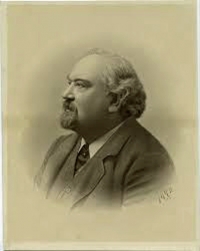
The death of Mr. William Smallwood, the writer and arranger of numerous pianoforte pieces of world-wide popularity, took place on the 6th ult. He was not of advanced age, having died in his sixty-sixth year. The writer was a life-long friend, and mourns his loss with many other musical associates.
racers-x
Racer X was an American heavy metal band formed in 1985 in Los Angeles, California. The group has gone through a hiatus, and a few lineup changes with bassist Juan Alderete and vocalist Jeff Martin being the sole constant members. The band is signed to Shrapnel Records
Ennio Morricone
Ennio Morricone, OMRI (born November 10, 1928), is an Italian composer and conductor. He has composed and arranged scores for more than 500 film and television productions. Morricone is considered as one of the most influential film composers since the late 1950s. He is well-known for his long-term collaborations with international acclaimed directors such as Sergio Leone, Brian De Palma, Barry Levinson, and Giuseppe Tornatore.
He wrote the characteristic film scores of Leone's Spaghetti Westerns A Fistful of Dollars (1964), For a Few Dollars More (1965), The Good, the Bad and the Ugly (1966), Once Upon a Time in the West (1968), The Great Silence (1968), and My Name Is Nobody (1973). In the 80s, Morricone composed the scores for John Carpenter's horror movie The Thing (1982), Leone's Once Upon a Time in America (1984), Roland Joffé's The Mission (1986), Brian De Palma's The Untouchables (1987) and Giuseppe Tornatore's Cinema Paradiso (1988).
His more recent compositions include the scores for Oliver Stone's U Turn (1997), Tornatore's The Legend of 1900 (1998) and Malèna (2000), Mission to Mars (2000) by Brian De Palma, Fateless (2005), and Baaria - La porta del vento (2009). Ennio Morricone has won two Grammy Awards, two Golden Globes and five Anthony Asquith Awards for Film Music by BAFTA in 1979–1992. He has been nominated for five Academy Awards for Best Music, Original Score in 1979–2001. Morricone received the Honorary Academy Award in 2007 "for his magnificent and multifaceted contributions to the art of film music". He was the second composer to receive this award after its introduction in 1928.
He wrote the characteristic film scores of Leone's Spaghetti Westerns A Fistful of Dollars (1964), For a Few Dollars More (1965), The Good, the Bad and the Ugly (1966), Once Upon a Time in the West (1968), The Great Silence (1968), and My Name Is Nobody (1973). In the 80s, Morricone composed the scores for John Carpenter's horror movie The Thing (1982), Leone's Once Upon a Time in America (1984), Roland Joffé's The Mission (1986), Brian De Palma's The Untouchables (1987) and Giuseppe Tornatore's Cinema Paradiso (1988).
His more recent compositions include the scores for Oliver Stone's U Turn (1997), Tornatore's The Legend of 1900 (1998) and Malèna (2000), Mission to Mars (2000) by Brian De Palma, Fateless (2005), and Baaria - La porta del vento (2009). Ennio Morricone has won two Grammy Awards, two Golden Globes and five Anthony Asquith Awards for Film Music by BAFTA in 1979–1992. He has been nominated for five Academy Awards for Best Music, Original Score in 1979–2001. Morricone received the Honorary Academy Award in 2007 "for his magnificent and multifaceted contributions to the art of film music". He was the second composer to receive this award after its introduction in 1928.
Louis Bourgeois
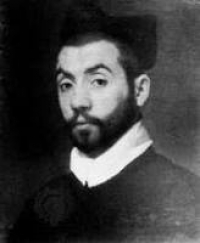
Loys "Louis" Bourgeois was a French composer and music theorist of the Renaissance. He is most famous as one of the main compilers of Calvinist hymn tunes in the middle of the 16th century.
Music theory

Music theory is the study of the practices and possibilities of music. The Oxford Companion to Music describes three interrelated uses of the term "music theory"
Volksweise
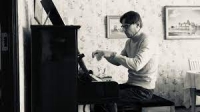
Volksweise Musical artist Maria durch ein Dornenwald ging Zur Weihnachtszeit 1-6 · 2012 Es wird scho glei dumpa
Zur Weihnachtszeit 1-6 · 2012 Heidschi Bumbeidschi Zur Weihnachtszeit 1-6 · 2012.
Zur Weihnachtszeit 1-6 · 2012 Heidschi Bumbeidschi Zur Weihnachtszeit 1-6 · 2012.
John Barry
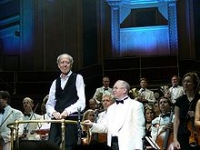
John Barry, OBE (born John Barry Prendergast on 3 November 1933 in York, England) is an English film score composer. He is best known for composing 11 James Bond soundtracks and was hugely influential on the 007 series' distinctive style.
Renato Zero
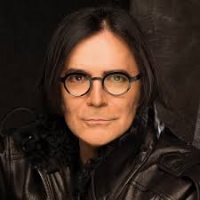
Renato Zero (Italian pronunciation: ) is the stage name of Renato Fiacchini (born 30 September 1950), an Italian singer, songwriter, producer, dancer and actor whose career spans a full six decades, from the 1960s to the 2010s, with 40 million records sold, becoming one of the best-selling Italian music artists.
 Sheet Music Max is a site for those who wants to access popular sheet music easily,
letting them download the sheet music for free for trial purposes.
It's completely free to download and try the listed sheet music, but you have to delete the files after 24 hours of trial.
Don't forget, if you like the piece of music you have just learned playing,
treat the artist with respect, and go buy the original sheet music.
Sheet Music Max is a site for those who wants to access popular sheet music easily,
letting them download the sheet music for free for trial purposes.
It's completely free to download and try the listed sheet music, but you have to delete the files after 24 hours of trial.
Don't forget, if you like the piece of music you have just learned playing,
treat the artist with respect, and go buy the original sheet music.
